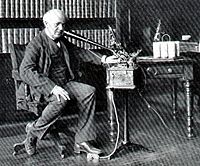The Myth of Chronic Anxiety: "Disorder" — Or Evidence That Your Brain Works Fine?
By Robert Mantell, Ph.D., C.M.Ht.Phobias.
Panic attacks.
Agoraphobia.
Post-traumatic stress.
Obsessive-Compulsive Disorder.
Social Phobia.
Pretty scary sounding stuff for most of us. And even more scary if you are among the 1 in every 12 Americans who suffers with some form of chronic anxiety problem serious enough to seek professional help.
When a person finds him or herself experiencing disturbing levels of anxiety too often, the first thing most people do is open the Yellow Pages and start looking around for a counselor or
psychotherapist. Upon a first meeting, the well-meaning therapist listens, takes notes, looks for emotional and behavioral patterns, and armed with that information, consults a professional manual known as The
Diagnostic and Statistical Manual of the
American Psychiatric Association (
DSM-IV).
Based on the presence of one or more prescribed elements therein, the therapist develops a diagnosis of one or more
mental disorders to explain what's "wrong" with you. And, of course, once you've been diagnosed, the therapist uses the totality of his or her knowledge base and experience to attempt to help you "recover".
Depending on the branch of medical or psychological help consulted, the doctor or therapist may choose to begin individual or group
psychotherapy. Many purported specialists in the field of anxiety treatment may go a step further in utilizing an approach called
Cognitive-Behavioral Therapy (or CBT), currently considered the "state-of-the-art" in anxiety treatment. Using a process known as progressive desensitization (also called graduated
exposure therapy), or in its most protracted form, flooding, this approach often requires the patient to endure extended periods of direct exposure to their feared stimulus. Many such specialists will suggest or prescribe medications such as Xanax, Paxil, Klonopin, Celexa, Zoloft and others to augment the psychological interventions being employed.
* * * *
How exactly the therapist attempts to "cure" such a person is not the point of this article. The fact that he or she is even attempting to cure something that he or she thinks is "wrong" with you and needs to be "cured" is the point.
You see, I have questions about whether or not the presence of chronic, even debilitating anxiety — or any other emotional or behavioral problems, for that matter — are truly evidence that a mental disease or disorder is present in the first place.
Don't get me wrong — I know that people with these kinds of problems are feeling ways they don't want to be feeling, and/or behaving in ways they don't want to be behaving — and that, ostensibly, they've sought professional assistance in alleviating their symptoms because they can't seem to help it.
But is that evidence that there's something actually wrong with the person? That they have a mental disease or a mental disorder? I don't know.
You see, when you take the time to carefully examine a person's history, almost without fail, you begin to see how the presence of anxiety-related symptoms in a person's life could actually make a lot of sense.
Let me tell you what I mean by this.
I believe the brain has a positive intent for everything it does — everything — including causing a person to experience chronic and debilitating forms of anxiety such as phobias, panic attacks, post-traumatic stress, agoraphobia, social phobia, and OCD. (By the way, I believe this notion extends to emotional problems that most would consider even psychotic by nature, including schizophrenia, bipolar disorder, and so forth.)
I believe the positive intent on the part of the subconscious mind for objectifying any chronic emotional or behavioral symptoms in a person's life is simply to protect that person from pain — specifically, the same kind of pain they experienced earlier on in life, usually (but not always) in childhood. Thus, the positive purpose for the presence of the various expressions of anxiety in a person's life is to act as a kind of protective barrier, if you will, from the kinds of situations, circumstances, people or things the brain greatly fears will lead to pain, based on past experience.
From this standpoint, the presence of
clinical anxiety could be considered a useful, and even a healthy response.
LET'S TAKE AN EXAMPLE
Suppose Lisa has been a little too busy, with too much on her plate, and has not paid nearly enough attention to creating balance in her life. Over the preceding weeks, months or even years, Lisa has been plagued with chronic psychosomatic symptoms such as headaches, backaches, tight muscles, stomach cramps, and so forth. These kinds of psychosomatic symptoms, by the way, are often the brain's "signal" — it's calling card, if you will — that one has organized their life in such a way that it is terribly out of balance, and requires some serious balancing now!
Because the brain does not speak English, Lisa doesn't get what's really going on here — the message being delivered from her subconscious mind by way of these physical symptoms: "Mellow out, slow down... Stop working so hard, so often. Slow it down for awhile and smell the roses for a change! If you don't, I'll soon be unable to manage all the stress you're creating, and eventually I won't be able to keep it suppressed any longer!"
Suppose Lisa doesn't get the message being offered by her subconscious mind, and eventually, sure enough, all that pent-up stress finally boils over. This is called a panic attack, folks.
And suppose Lisa unexpectedly experiences this panic attack while she's in the car driving. If you've never had a panic attack, I can tell you that it usually comes upon a person for the first time seemingly from out of nowhere — often at the most unexpected times, and in the most unexpected places. I can also tell you that the experience of a full-blown panic attack is extremely fear-provoking, often causing a person to imagine that he/she is losing her mind, or perhaps that he or she may even be having a heart attack! Yup... Scary stuff, for sure.
REMEMBER PSYCHOLOGY 101? LET'S REVIEW CLASSICAL CONDITIONING
Recall that the brain's “prime directive”, if you will, is to protect the person from pain in any way possible. One of the ways the brain does this is to link fear with whatever's going on in the environment when the person is in such distressed state. Utilizing a well-known learning process called classical conditioning, the person's brain makes a mental note (sort of like a taking a mental snapshot) of what exactly was going on in the person's environment when he/she was so terribly uncomfortable.
This kind of powerful neuro-associative pairing is so deeply ingrained, that days, weeks, months or even years could go by before the person may find him or herself in a similar situation or context, and when they do, BAM! The person goes right back into the same kind of traumatized state they experienced the first time they encountered the fear-provoking situation.
Thus, now, whenever this person even THINKS about returning to the same kind of environment wherein she experienced the original trauma, she experiences great fear and will (for example) avoid the actual experience of getting back in the car and driving at almost all costs.
Why? Because fear is the brain's most effective tool for keeping a person away from things that could potentially cause the same kind of intense pain they experienced earlier in life. Well, if once upon a time a person had experienced great pain in a particular situation or circumstance, now, whenever the person so much as thinks about being in such a situation, he/she experiences tremendous anxiety.
In the example of Lisa's panic attack in the car, because that experience was so terribly upsetting, her brain linked up pain with the idea of being back in the car. Now, every time she thinks about what it would be like to be driving (essentially mentally recreating the same conditions that were present in the earlier painful experience), she experiences intense anxiety. The positive purpose for the brain's objectifying that tremendous fear is to protect Lisa from possibly returning to the same sort of context that led to great pain for her in the past.
This fear is what some people would now think of as a phobia to driving.
(Ever drink too much whisky, wine or beer, and get very, very sick?? if so, I'm willing to bet that now, whenever you so much as THINK of that substance, you can feel yourself getting sick. In a not so dissimilar way, your aversion to that substance can be thought of as a kind of "phobia" to it.)
And even though the ongoing fear of driving may not necessarily be a desirable mental "program" to maintain over time, the fact is, considering this person's past, this fear — this phobia — seems to make a lot of sense, doesn't it? In fact, this phobic behavior could even be considered healthy, reasonable and biologically adaptive — hardly justification to diagnose someone with this kind of problem as mentally ill, with a phobic “disorder” of some kind!
AN ALTERNATIVE APPROACH TO THE RESOLUTION OF CLINICAL ANXIETY
Rather than treat this kind of challenge as evidence of a mental disease, as though something is truly psychologically "wrong" with the person, we find it preferable to view this person's anxiety-related symptoms as nothing more than the brain's best strategy — the brain's best self-defense mechanism, if you will — to keep a person out of the same kind of intense pain they had when they were younger. And fascinatingly, it's almost always effective! It's ingenious, in fact. (In fact, if it weren't effective, the brain wouldn't continue to invest energy in maintenance of the behavior — the anxiety symptom would disappear, all on its own.)
Thus, rather than try to “fix” something that is regarded as wrong with the person, we believe that the anxiety-related behavior simply requires to be recognized first by the subconscious mind as an old and outdated strategy for protection, and then released when the brain comes to understand that it is no longer necessary to be maintained as a protective mechanism. And because the brain works on something called the Principle of Economy of Effort (more on this later in another article), the brain will be only too glad to stop wasting energy on maintenance of a behavior that it finds is not worth the investment.
For example, although the response may have made a lot of sense when the person was younger, the brain may come to understand that it's probably OK to let the behavior go at this point because, chances are, the person is now bigger, better, stronger and faster then they ever were when they were younger. And they are probably in possession of far greater resources now, should they encounter the same kind of troublesome situation, than they ever could have brought to bear in their younger years due to their relative inexperience at the time.
There are many ways to communicate and demonstrate this to the person's subconscious mind. These brief therapeutic treatment modalities range from hypnosis, to direct behavioral intervention, to outright disruption of a person's mental “recipe” for creating their age-old anxiety-related response.
Regardless of the specific method used to make the change, the bottom line is that when a person learns to perceive differently whatever they used to fear, they can't help but feel, and therefore respond, differently to it.
Is it really appropriate to think of this as "fixing" what's gone mentally wrong with a person?
We prefer to assign no more meaning to it than simply the process of helping our client to change a behavior that clearly doesn't work for them. This approach is more congruent with how we like to think of our clients. We like to think of our clients as individuals who are simply doing the very best they can at any given moment in time with the resources they have available to them. We feel our job is merely to assist our clients to gain access to greater and more powerful resources, and in the process, enjoy greater behavioral choice and flexibility in the old, formerly troublesome contexts.
Click Here For More Information
 Image by kingstongal via Flickr
Image by kingstongal via Flickr![Reblog this post [with Zemanta]](http://img.zemanta.com/reblog_e.png?x-id=6e4ee026-9e57-4797-bf2c-5948c6008ab2)

![Reblog this post [with Zemanta]](http://img.zemanta.com/reblog_e.png?x-id=7ea29cf5-7ed2-459d-a20c-12230db3717c)

![Reblog this post [with Zemanta]](http://img.zemanta.com/reblog_e.png?x-id=657b2431-e09b-4910-bf88-45b1b5cb9ca4)

![Reblog this post [with Zemanta]](http://img.zemanta.com/reblog_e.png?x-id=49720196-b75f-4b82-ac7c-f477c270b965)

![Reblog this post [with Zemanta]](http://img.zemanta.com/reblog_e.png?x-id=6e0badcb-4553-4ffe-85aa-65f2360475ff)

![Reblog this post [with Zemanta]](http://img.zemanta.com/reblog_e.png?x-id=5461dcc6-abc8-45da-b6a7-26850ab3f482)
![Reblog this post [with Zemanta]](http://img.zemanta.com/reblog_e.png?x-id=b18d28de-c6d3-405d-b18e-9d4743373577)
![Reblog this post [with Zemanta]](http://img.zemanta.com/reblog_e.png?x-id=b750938d-f1ab-4dea-a584-f74e9347d8f8)
![Reblog this post [with Zemanta]](http://img.zemanta.com/reblog_e.png?x-id=462dd468-a911-4d8c-a6ae-d0d089c3ba1b)
![Reblog this post [with Zemanta]](http://img.zemanta.com/reblog_e.png?x-id=c17250dc-ed5a-45a2-9ac8-e6eb5aa27f6b)
![Reblog this post [with Zemanta]](http://img.zemanta.com/reblog_e.png?x-id=5bc15f4e-0404-42fb-832d-cf07d5065133)

![Reblog this post [with Zemanta]](http://img.zemanta.com/reblog_e.png?x-id=75131051-856b-407c-9997-ab7e8167f537)
![Reblog this post [with Zemanta]](http://img.zemanta.com/reblog_e.png?x-id=5b8ba80a-5d71-4da5-a87e-c1454b28b743)
![Reblog this post [with Zemanta]](http://img.zemanta.com/reblog_e.png?x-id=b11c6bb4-fb84-46f0-8fa8-119bc8e4092b)